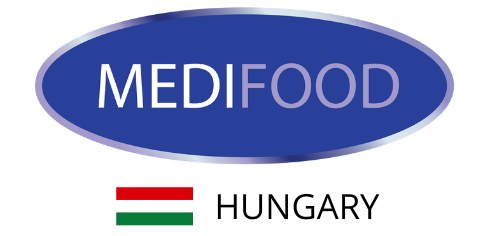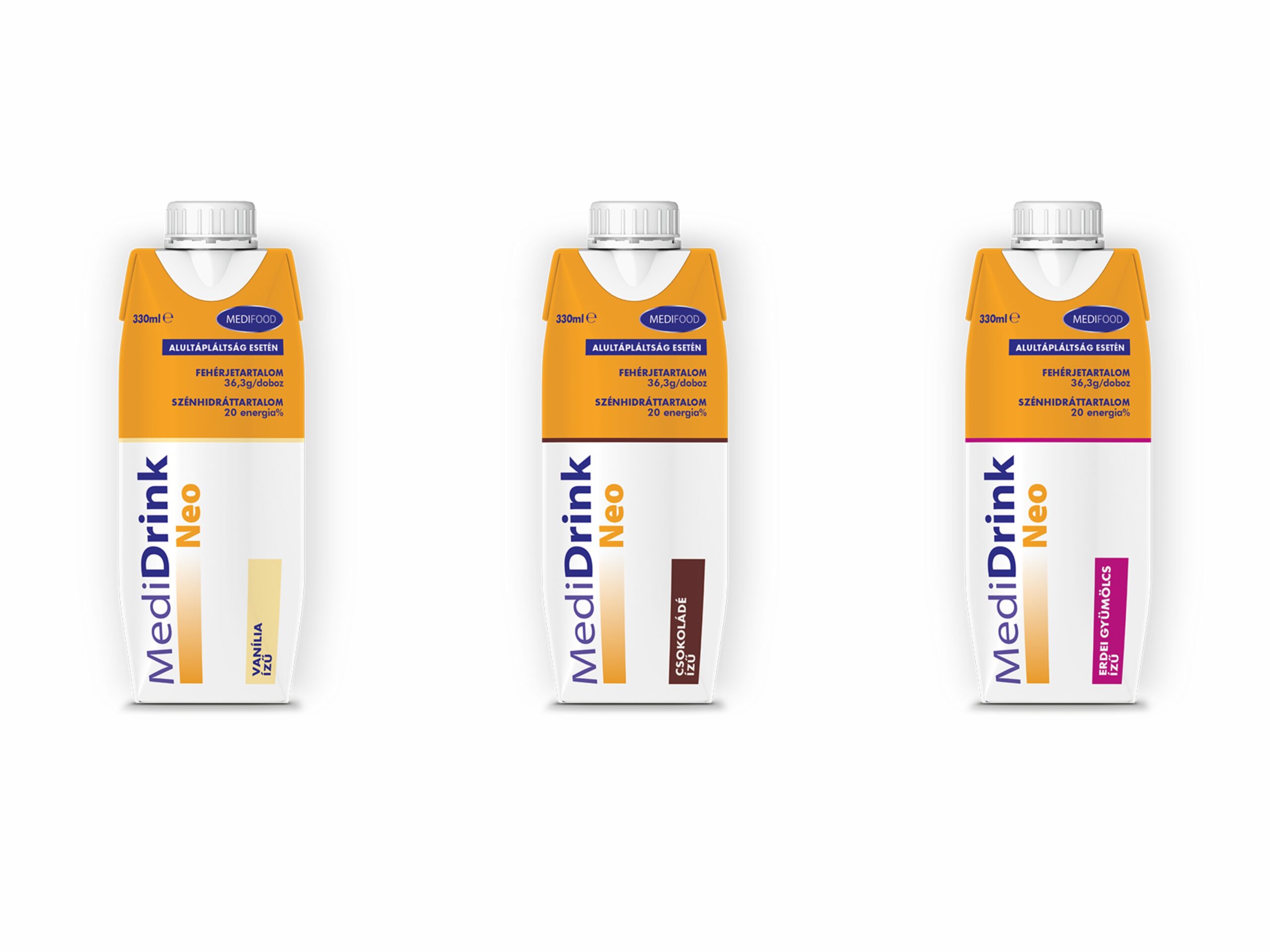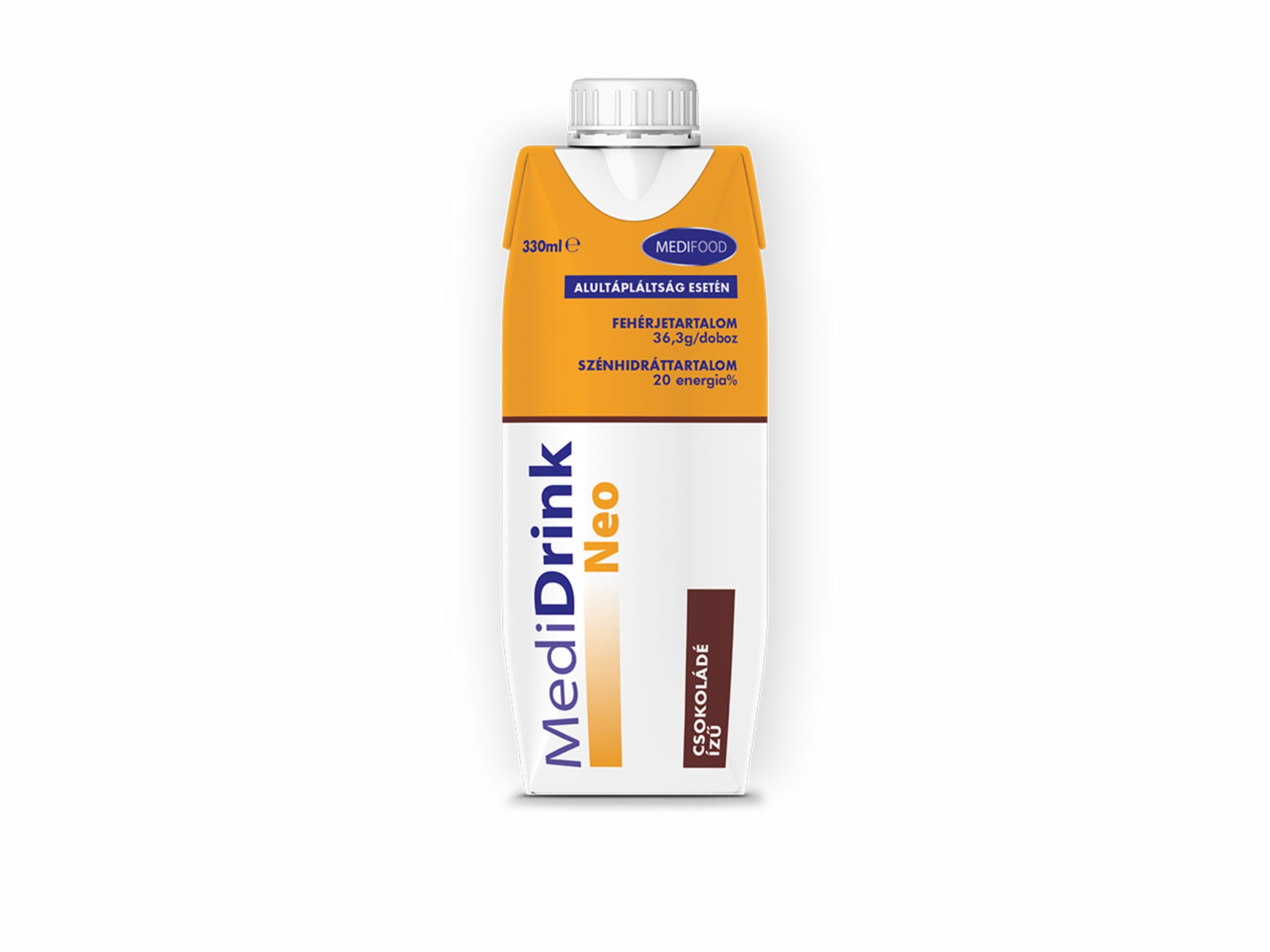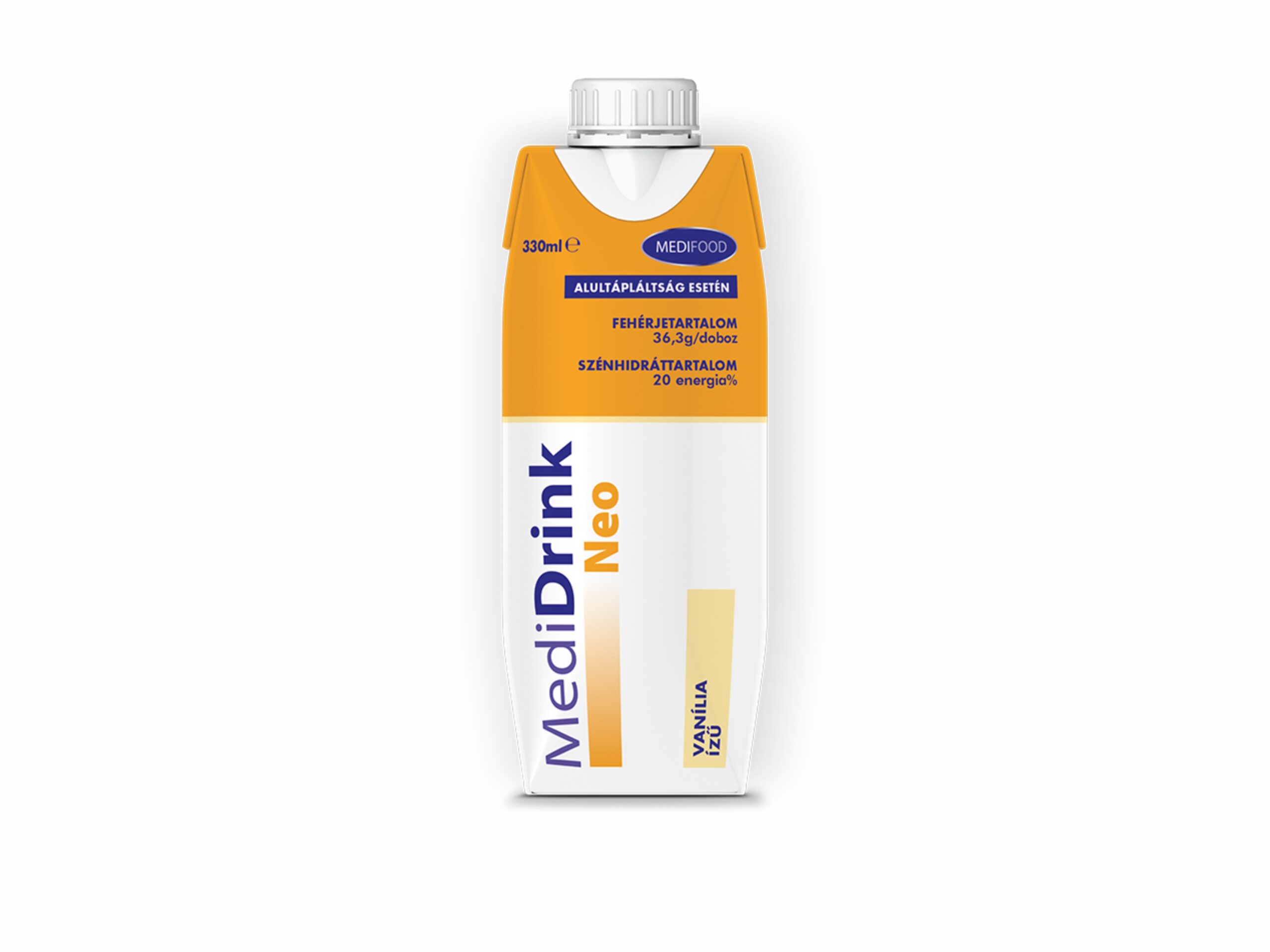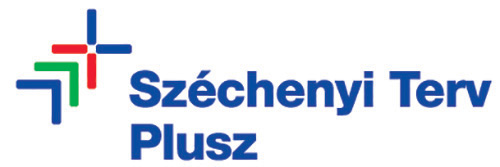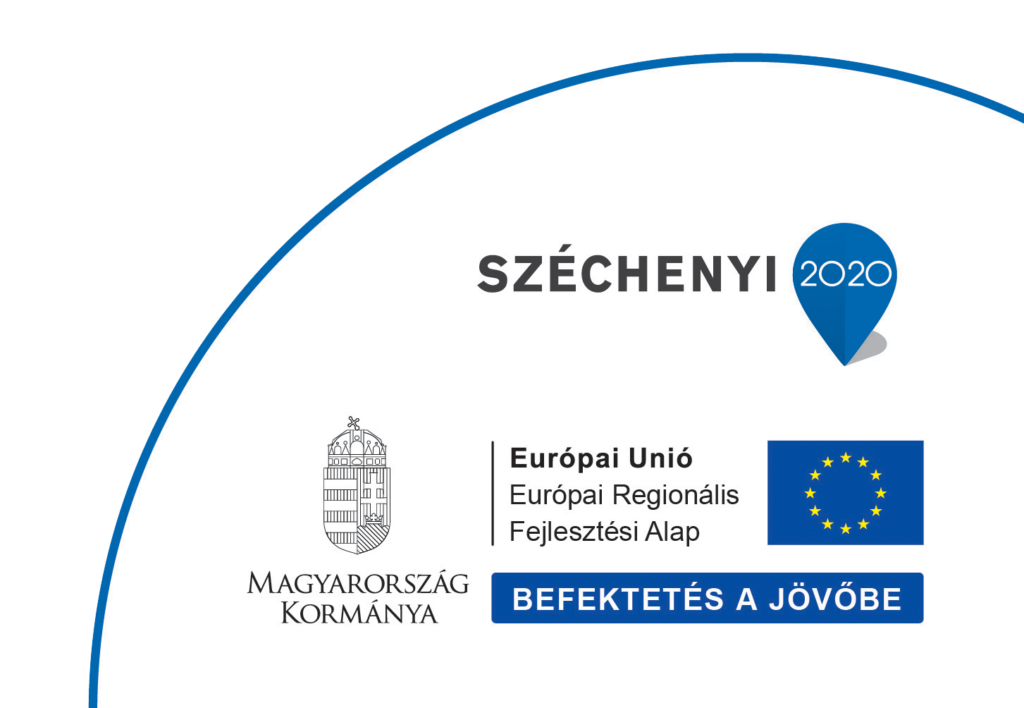MediDrink Neo
- Kezdőlap
- >
- Egészségügyi Szakemberek részére
- >
- MediDrink Neo
Betegséghez kapcsolódó alultápláltság
A betegséghez kapcsolódó alultápláltság évek óta jelentős, de aluldimenzionált probléma, amely mintegy 20 millió beteget érint az Európai Unióban, és 33 millió beteget Európa valamennyi országában (Ljungqvist et al. 2009, Ljungqvist et al. 2010). A betegséghez kapcsolódó alultápláltság a betegség és a szükségleteknek nem megfelelő táplálék-bevitel együttes következményeként alakul ki (Naber et al. 1997). Következésképp, a kezelésnek nem csak magát a betegséget, hanem a klinikai táplálást is magában kell foglalnia.
Betegséghez kapcsolódó alultápláltság daganatos betegségben
Daganatos betegségekben több, mint 30%-ban a cachexia a halál oka, és a betegek több, mint 50%-ában jelen van a cachexia a halál bekövetkeztekor (von Haehling & Anker. 2010). A testsúlyvesztés (fogyás) is nehézséget jelent a daganatos betegek számára, mivel az izomtömeg-vesztés egyrészt mások számára is “láthatóvá teszi a betegséget”, másrészt a közeli halál jelének fogják fel (Aapro et al. 2014).
Daganatos cachexiában jellemző a krónikus negatív energia- és fehérje-egyensúly. A cachexia kezelése a legutóbbi időkig a tápanyag-bevitel növelését tartotta elsődlegesnek, bár ez önmagában nem képes az anyagcserében bekövetkezett változások visszafordítására (Tisdale et al. 2004).
Klinikai táplálás daganatos betegségben
Magas energia- és fehérjebevitel kedvezően befolyásolja a daganatos betegek tápláltsági állapotát és életminőségét (Laviano et al. 2005, Baldwin et al. 2012, Marin Caro et al. 2007, Bosaeus et al. 2002, Jéquier E., Bauer & Capra 2005).
A legtöbb daganatos sejtnek állandó szintű glükóz-ellátásra van szüksége, és a mitokondriális diszfunkció miatt nem képes jelentős mennyiségű zsírsav- vagy ketontest metabolizálására (Klement & Kämmerer 2011). Több vizsgálatban kimutatták az alacsony szénhidrát- és magas zsírtartalmú étrend kedvező hatásait daganat jelenléte esetén (Lee et al. 2002, Mathews et al 2014, Mathews et al. 2020, Ho et al. 2011, Breitkreutz et al. 2005). Az alacsony szénhidrát-tartalmú étrend biztonságos és tolerálható (Cohen et al. 2018, Schmidt et al. 2011, Fine et al. 2012, Rieger et al. 2014, van der Louw et al. 2019).
A krónikus gyulladásos folyamat intenzitásának csökkentése segítheti az elsődleges daganatellenes kezelés hatékonyságát és javíthatja az alultáplált daganatos betegek életminőségét (Samaras et al. 2014, Colomer et al. 2007, Giacosa & Rondanelli. 2008, Ioannidis et al. 2011, Guagnozzi et al. 2012). Omega-3 zsírsavakban gazdag étrend negatívan befolyásolja a gyulladásos kaszkád intenzitását (Laviano et al. 2013).
Bizonyítékok mutatnak arra, hogy az L-karnitin képes a krónikus gyulladás és az oxidatív stressz csökkentésére (Silverio et al. 2011), valamint javítja a tápláltsági mutatókat daganatos betegeknél (Kraft et al. 2012).
A kolinhiány növeli a mutációs rátát, ami összefüggésben áll a daganatkialakulás fokozott kockázatával (Zeisel S. 2012).
A sebgyógyulás milyensége fontos tényező operált betegeknél. A zavartalan sebgyógyulás biztosítása sokszor jelentős problémaként lép fel. Specifikus bioaktív kollagén peptidekről kimutatták, hogy kedvezően hatnak a mátrix szintézisre és a bőr fiziológiájára (Knefeli & Durani. 2017).
Immunnutriens formulák befolyásolhatják a gyulladásos és az immunválaszt daganatos betegségben. Az immunnutriens formulák általában arginint, omega-3 zsírsavakat, glutamint és RNS-eket tartalmaznak (Prieto et al. 2017).
Krónikus cinkhiányban megnő a gyulladásos citokinek termelése, amely nagyszámú gyulladásos betegség kimenetelét befolyásolhatja (Bonaventura et al. 2015). E-vitamin és cink szupplementáció daganatos betegségben kedvezően hathat a kemoterápia okozta mellékhatásokra (Berretta et al 2013, Pace et al 2003, Lin et al. 2006, Arbabi-kalati et al. 2012).
MediDrink Neo
A MediDrink Neo 2,2 kcal/ml energiatartalmú, teljes értékű, laktóz- és gluténmentes, immunnutriens komponenseket tartalmazó speciális gyógyászati célra szánt élelmiszer daganat kapcsán kialakult alultápláltság diétás ellátására.
A MediDrink Neo 3 év alatti gyermekeknek, valamint galaktozémiában és örökletes fruktóz intoleranciában (fruktozémiában) szenvedő betegeknek nem adható.
A MediDrink Neo napi adagját a kezelőorvosnak kell meghatároznia.
A MediDrink Neo jelenleg 3 ízben (csokoládé, erdei gyümölcs, vanília) van forgalomban.
Compliance, biztonságosság, tolerabilitás
A compliance szignifikánsan magasabb ≥2 kcal/ml energia-tartalmú iható tápszerek esetén a standard 1,5 kcal/ml energia-tartalmú iható tápszerekhez képest (Hubbard et al. 2012). Az iható tápszerek ízletessége a betegek számára szignifikánsan magasabb tejfehérje-alapú tápszerek esetén (Darmon et al. 2008).
A MediDrink Neo diabetes mellitus társbetegség esetén is adható (Medifood Data on file 2019).
Irodalom
Bonaventura P. et al. Zinc and its role in immunity and inflammation. Autoimmun Rev 2015;14:277-85.
[Complete therapy with clinical nutrition] Nutricia, 2016
Elia M. et al. To screen or not to screen for adult malnutrition? Clin Nutr 2005;24:867-84.
Fajcsák Zs. and Lelovics Zs. [Glycemic load and glycemic index.] Új Diéta 2006;4:28-9.
Freijer K. et al. The economic costs of disease related malnutrition. Clin Nutr 2013;32:136-41.
Giacosa A. and Rondanelli M. Fish oil and treatment of cancer cachexia. Genes Nutr 2008;3:25-8.
Gillingham L. The metabolic fate of alpha-linolenic acid (ALA). IHP Magazine 2013.
Hite AH. et al. Low-carbohydrate diet review: shifting the paradigm. Nutr Clin Pract 2011;26:300-8.
http://manage.nutricia.com/uploads/documents/Forticare_ie.pdf accessed on 26th March 2019
https://abbottnutrition.com/ensure-enlive-advanced-nutrition-shake accessed on 26th March 2019
https://abbottnutrition.com/glucerna-shake accessed on 26th March 2019
https://nutrition.abbott/uk/product/prosure accessed on 26th March 2019
https://www.caringforlife.hk/filemanager/product/47/product_info_en.pd accessed on 26th March 2019
https://www.fresenius-kabi.com/no/documents/Factsheet_Supportan_DRINK_09_2017_VIEW.pdf accessed on 26th March 2019
https://www.fresubin.be/fr-be/produits/fresubin-db-drink/ accessed on 7th November 2023
https://www.nestlehealthscience.co.uk/brands/impact/impact accessed on 26th March 2019
https://www.nestlehealthscience.in/brands/resource-diabetic accessed on 26th March 2019
https://www.nestlehealthscience-me.com/en/brands/resource/resource-support-plus accessed on 26th March 2019
https://www.who.int/features/qa/malnutrition/en/ accessed on 23rd March 2020
Laviano A. et al. Omega-3 fatty acids in cancer. Curr Opin Clin Nutr Metab Care 2013;16:156-61.
Ljungqvist O. et al. The European fight against malnutrition. Clin Nutr 2010;29:149-50.
Ljungqvist O. Man FD. Under nutrition: a major health problem in Europe. Nutr Hosp 2009;24:369-70.
Medifood data on file 2019
Stattin P. et al. Prospective study of hyperglycemia and cancer risk. Diabetes Care 2007;30:561-7.
Stratton RJ. et al. Disease-related Malnutrition: An Evidence-based Approach to Treatment. CABI Publishing, 2003.
Tisdale MJ. Pathogenesis of Cancer Cachexia. J Support Oncol 2003;1:159–68.
Tisdale MJ et al. Cancer cachexia. Langenbecks Arch Surg 2004;389:299-305.
Welch AA. et al. Dietary intake and status of n-3 polyunsaturated fatty acids in a population of fish-eating and non-fish-eating meat-eaters, vegetarians, and vegans and the precursor-product ration of α-linolenic acid to long-chain n-3 polyunsaturated fatty acids: results from the EPIC-Norfolk trial. Am J Clin Nutr 2010;92:1040-51.
www.fresenius-kabi.co.uk accessed on 26th March 2019
www.fresenius-kabi.ie accessed on 26th March 2019
Zeisel SH. Choline, other methyl-donors and epigenetics. Nutrients 2017;9:445.
Zitvogel L. et al. Nutrition, inflammation and cancer. Nat Immunol 2017;18:843-50.

